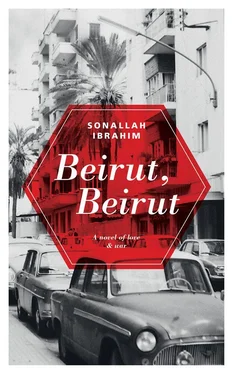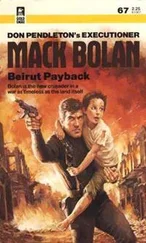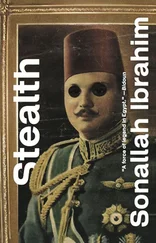A newspaper headline: “Phalangists refuse to shut down their radio broadcasts.”
Zgharta. Frangieh’s palace. The former president to reporters: “We won’t throw down our rifles until calm returns.”
A newspaper headline: “The Lebanese National Movement informs the Deterrent Forces’ leadership of the two places for collecting their weapons.”
Abu Mazen to reporters: “The resistance will not hand over its weapons but it will move them from the cities to the south.”
The French magazine Nouvel Observateur . A circle around a paragraph from a conversation with Jumblatt: “The Palestinians had carried on a kind of mandate over us: military administration and the means of subsistence and communication were in their hands.”
A newspaper headline: “Censorship of Lebanese newspapers has begun.”
A newspaper headline: “United political leadership between Egypt and Syria. Agreement to hold the Geneva conference before April, provided that the Palestinians are represented by an independent delegation.”
Alexandria. Saint Mark’s Cathedral.
Title card:
On January 17, 1977, Egyptian Copts in Alexandria held the first conference of its kind in modern Egyptian history. In attendance was Pope Shenouda III, who, since his election to the papal chair in 1971, had won great popularity among the Copts. Abba Samuel, the official in charge of foreign relations for the Coptic Church, had played a prominent role in organizing this conference. The conference examined “freedom of belief” and “the freedom to practice religious ceremonies”, “protection of the family and Christian marriage”, “equality and equal opportunity and the representation of Christians in parliamentary bodies”, and “the danger of extremist religious movements”.
The conference presented several demands to the authorities: “cancelling the proposed law on apostasy from Islam”, “abandoning plans to apply laws derived from Islamic sharia to non-Muslims”, “revoking Ottoman-era laws that restrict the right to build churches”, “rejecting sectarianism in filling government employment positions at all levels”.
On the same day…
Egyptian newspapers carry giant headlines: “Cancellation of subsidies for some commodities in compliance with demands of International Monetary Fund. List of 25 commodities whose prices have ‘moved’.”
Title card:
Early morning the next day, January 18, 1977, demonstrations set out to protest the new price increases in Alexandria. Then, hours later, they broke out in Cairo. Before noon, the demonstrations had struck the length and width of Egypt.
On the next day, the demonstrations were joined by some elements that rashly gave in to looting and destruction. Angry masses in Aswan marched by the presidential retreat there that Sadat loved — it was his favorite winter headquarters — and he was forced to flee and return to Cairo under the protection of Central Security troops.
Dozens were killed, fallen victim to the bullets of Central Security.
Chouf in Lebanon. Mourners flock to the funeral of a local resident. Kamal Jumblatt joins the mourners. Some form a circle around him. He talks to them about his philosophy of death, saying: “A person smells the odor of his impending death three days beforehand.”
Title card:
Two days later, on March 16, 1977, Kamal Jumblatt (age sixty) gets into his black Mercedes on his way from al-Mukhtara palace to his country house in Chawiya, where he was accustomed to secluding himself every Friday, immersed in books and nature, 1,500 meters above sea level.
But this time he wore khaki clothes, and helped several laborers move rocks in order to level a piece of land he had chosen for his private bodyguard. Afterwards he brought for his companions food consisting of eggs, local cheese and apples, to a table made of two large stones. When he finished lunch, Jumblatt stood up and said, “Let’s go, we should be on our way.” He put on his clothes, then got into the car with his companions — his driver and his private bodyguard — on the road to Beirut.
At the crossroads for Deir Durit monastery…
Blood fills the ground. Jumblatt’s car pierced by bullets from every direction.
In front of the ancient al-Mukhtara palace. Beneath a cloth awning: Jumblatt laid out on a wide bier made of white silk, between his companions in life and death. Weeping women in black clothes, and white sashes, surround the bier. Long lines of people in black clothes pass in front of the bier in the rain. Machinegun volleys in the air mingle with sounds of thunder and flashes of lightning.
Beirut. A solemn procession of tens of thousands of people paying their respects at Jumblatt’s funeral.
The site of the crime once again. A car with this license plate number: Baghdad 72719.
Title card:
The car used by the perpetrators. But suspicions are directed toward another Arab capital.
A still photograph of another two-person meeting between Kamal Jumblatt and the Syrian President Hafez al-Assad in Damascus.
“There’s only the last part of the film left, and it’s about Operation Litani,” Antoinette said as she took the reel out of the machine. “Do you think we’ll be able to finish it tomorrow?”
“Why don’t we try today?” I wondered.
She looked at her watch.
“It’s three o’clock now. We have to have something to eat. And then I want to take you somewhere,” she said.
I gave her a quizzical look.
“I want you to meet someone I know,” she explained.
“Who?”
“I won’t tell you now.”
I stared at her in surprise.
“Do you trust me?” she asked.
“Of course.”
“Then don’t ask.”
We left the office and went out into the crowded street. We entered a small, hole-in-the-wall restaurant. We had zucchini with tomatoes, meat and rice, along with lentil soup. Antoinette insisted on paying the bill, which came to 20 lira.
We went back to where she had left her Volkswagen, and we got in. A little later, we were setting out on the road leading to the airport.
We reached the Sabra refugee camp, and she turned the car off the road toward it. Several gunmen accosted us at a barrier made of barrels. They were wearing the insignia of the Palestinian Armed Struggle. One of them recognized Antoinette and greeted her affectionately, so they let us pass.
Antoinette stopped the car a few meters further on, beside a falafel vendor who had several chairs and wooden tables set out — an open — air restaurant. She got her purse and rolled up her window, so I did the same thing with my window. Then I got out of the car and stood there looking at the jars of colorful pickled turnips distributed among the tables of the small restaurant.
She pulled me by the arm and we set out on a street crowded with boutiques and shops, including one for used clothes, which hung from hangers attached to the ceiling. The walls were covered with slogans, political posters and pictures of martyrs.
We headed toward a network of back alleys, with humble homes — most of them no more than two stories tall — set on the sides. The smell of fried onions and coriander with garlic slipped its way into my nose. I nearly bumped into several children who were playing football. We were forced to stop and stand against the walls to make room so that three women in black frocks, with their heads wrapped in white kerchiefs, could walk three abreast.
The sound of a heated argument reached us through a window overhead. I heard a woman yell in a real Egyptian accent, asking for her passport so she could go back to Egypt. We passed the three women again and then kept walking for several minutes. Then we went inside a house and knocked on a door belonging to one of the two first-floor apartments.
Читать дальше












